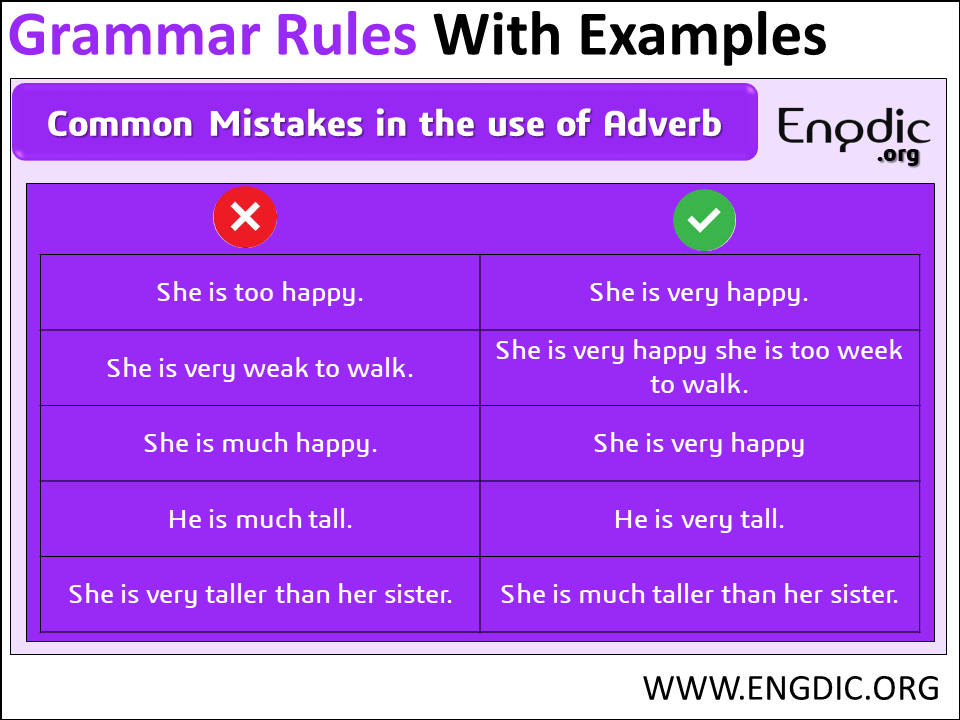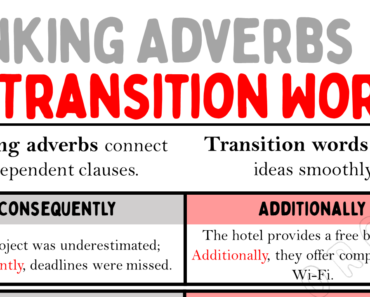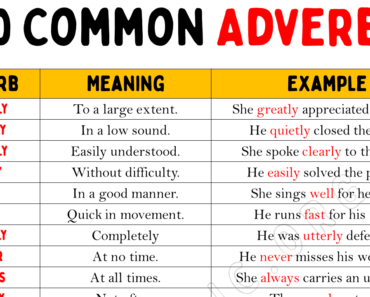Grammar rules for English related to Adverb are explained in this Article. After this article of the Grammar rules for English, you will be left with no confusion related to the Adverb.
This Post is Divided into three Parts.
- Rules Related Adverb.
- Practice Example Corrections.
- A simple Quiz to test your Credibility.
What is an Adverb?
An adverb is a word that modifies a verb.
i.e. He stopped by briefly to say hello.
In this Sentence Briefly is an Adverb
Grammar Rules Related Adverb
Rules no 1:
Always use Past Indefinite tense with these words:
Ago, Last, Yesterday, Past time.
She has written a letter two days ago. (Incorrect)
She wrote a letter two days ago. (Correct)
Rule no 2:
The adverb of time always comes after (is, are, am, was, were been) but before the verb.
Example:
He goes Frequently there. (Incorrect)
Frequently⇒ adverb of time
He frequently goes there. (correct)
Goes ⇒ Verb
He often is ill. (Incorrect)
He is often ill. (correct)
Rule No 3:
Always use ‘much’ with 2nd Degree. Avoid using ‘very.’
Example:
He is very older than I (Incorrect)
He is much older than I. (Correct)
Rule No 4:
When the Third Form of Verb is Used as an Adjective, prefer to use ‘Very’.
He is much Bored (Incorrect)
He is very Bored (Correct)
Rule No 5:
When the Third Form of Verb is used as a Passive Verb, prefer to use ‘Much’.
He is very Admired by his student. (incorrect)
He is much admired by his student. (correct)
Rule No 6:
Prefer to use Very with first Degree of Adjective.
Example:
Leone is Much Beautiful. (Incorrect)
Leone is Very Beautiful (Correct)
Rule No 7:
Prefer to use ‘Very’ with Present Particulate (Ing-Form), if it is used as an adjective.
I read a much interesting novel last night. (Incorrect)
I read a very interesting novel last night. (Correct)
Rule No 8:
Adjective à which Gives information About Noun.
Adverb à Which gives Information About verb.
Never use Adjective after Verb, Rather you can Use an Adverbial Phrase.
Example:
Naveed Treated Me Friendly. (incorrect)
Naveed Trod me in a Friendly Manner (Correct)
Note: In a Friendly Manner is an Adverbial Phrase.
Rule No 9:
Very Vs Too
Very ⇒ It Shows Proper Limits.
Too ⇒ It shows the Excess of something.
Examples:
He is Very Kind to me. (Correct)
He is too Weak to Walk. (correct)
Rule No 10:
Always use ‘other’ after (Second Degree of adjective + Than any)
Example:
He is taller than any boy in the class. (incorrect)
He is taller than any other Boy in the class. (correct)
Rule No 11:
Use One Part of Speech after nor…. Neither.
The formula for Making Sentences with Neither and Nor.
Neither + Verb —– Nor + Verb
/Neither + pronoun —– Nor + pronoun
Neither + noun —– Nor + noun
Examples:
He neither Come nor Writes. (Correct)
Neither Does He Comes nor Does He Writes. (Correct)
Note: Does is a Helping Verb Here.
Rules No 12:
For Two:
Neither, either, Between, Each, Each other.
For Greater the two:
None, anyone, among, Every, One another
Examples:
These two boys are quarreling with one another (Incorrect)
These two boys are quarreling with each other. (correct)
Rule No 13:
Always Use ‘should’ after ‘Lest’ in a Sentence.
He worked hard Lest he should fail. (Correct)
Rule No 14:
Much vs Many
Many ⇒ Many are always used with a countable noun.
Much ⇒ Much is always used with Uncountable.
Example:
I have Much Milk (Correct)
She has many books. (Correct)
List of Adverbs – Video
Grammar Mistakes Infographics
Grammar Mistake Examples
Incorrect |
Correct |
| She is too happy. | She is very happy. |
| He is very weak to walk. | He is too week to walk. |
| She is much happy. | She is very happy |
| He is much tall. | He is very tall. |
| She is very taller than her sister. | She is much taller than her sister. |
| He is much delighted. | He is very delighted. |
| Israel is very hated by the Muslim. | Israel is much hated by the Muslim. |
| This book is much interesting. | This book is very interesting. |
| She is very kind enough to me. | She is very kind to me. |
| He is enough kind to help me. | He is kind enough to help me. |
| Uzma is enough kind to help me. | Uzma frequently helps me. |
| She helps me frequently. | She treats the poor in a friendly way. |
| He treats the poor friendly. | He treats the poor in a friendly manner. |
| She walks lovely. | She walks in a lovely manner. |
| Neither he comes nor goes. | He neither comes nor goes. |
| She ran lest he might miss the train. | She ran lest he should miss the train. |
| He is beautifully singing | He is singing beautifully. |
| She brought many sugar. | She bought a lot of sugar. |
| He owns much books | He owns many books. |
| Writing a good book is too much difficult. | Writing a good book is much too difficult. |
| Do you sleep good? | Do you sleep well? |








